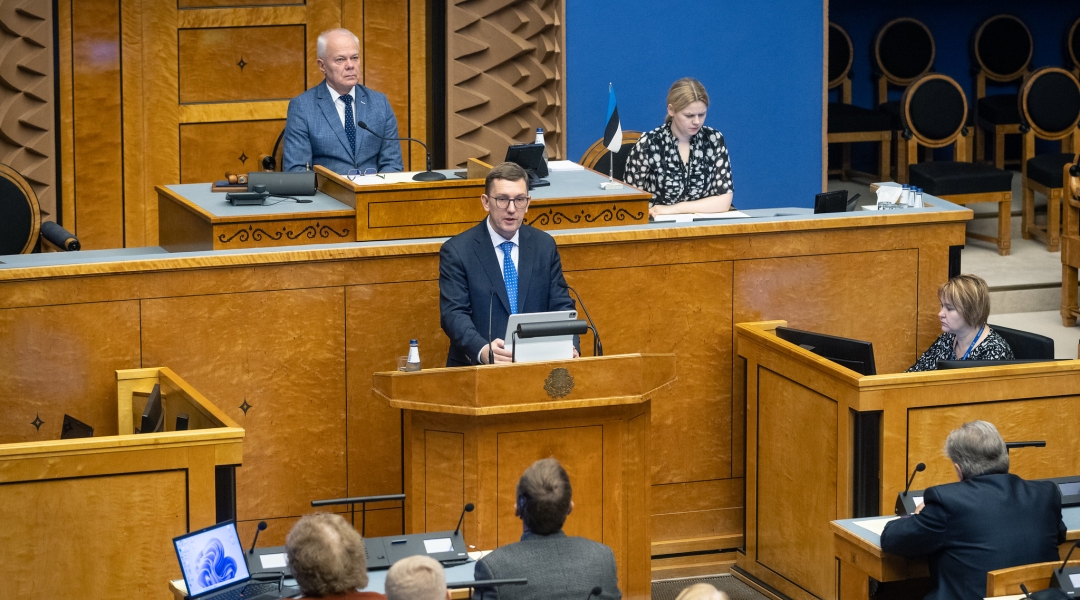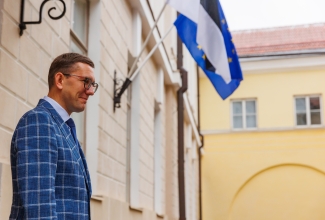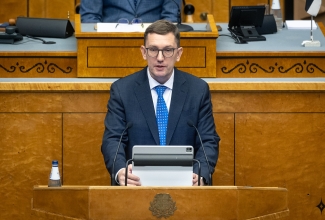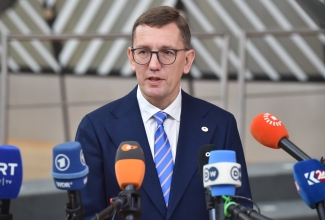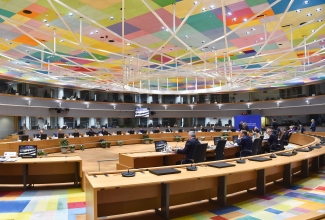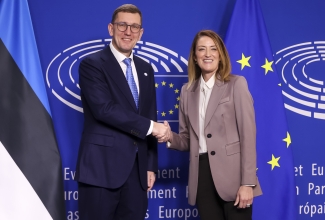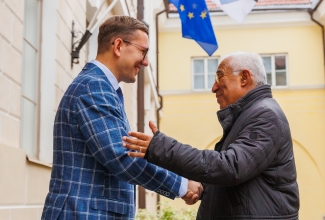A few years later, we were fresh out of the Soviet prison. We worked diligently to reintegrate our country with Western values and common space of security. If someone had said at the time that we would be celebrating 20 years as members of the European Union and NATO this year, none of us would have blinked an eye because we were so determined. However, if someone had said that one day an Estonian would be elected to lead the Common Foreign and Security Policy of the European Union, it would have been a little harder to believe. Estonia can now play its part in reversing the geographical imbalance in the distribution of top posts, but work does not stop there.
Today, Europe needs the same kind of acceleration that Delors envisioned in his day. The post-Cold War world order has never been under as much pressure as it is now. The share of the European economy in the world economy has never been so small.
One option is to continue in the same spirit, making cosmetic changes here and there. Another option is to take the steps that are actually needed. Help Ukraine to victory. Significantly boost Europe’s defence capabilities. Improve productivity and competitive edge by simplifying our business environment and investing in key sectors of the future. Achieving this requires hard choices, political courage, and unity.
Of course, the European Union does not exist in a vacuum. Europe must promote common strategic objectives with like-minded partners, NATO allies in particular, but also partners further afield. Today, many are watching presidential elections across the Atlantic. Our message is clear – no matter who the US president is, the US remains the most important political and economic partner for Europe. The aim of the Estonian government’s European Union policy is to make sure that Europe is strong and confident in its actions and credible as a partner.
Dear listeners,
According to a Eurobarometer survey published in July this year, almost two thirds of EU citizens worry about the security of the Union in the next five years. Estonia has been determined to make sure that raising defence readiness and crisis preparedness would be at the forefront. I assure you that this work has brought results because the new Commission has chosen these as priorities.
Europe’s ammunition production capacity is on the rise, although not fast enough. Russia tripled its production last year and has fully transitioned to a war economy. The President of the Commission Ursula von der Leyen has stated that Europe needs to invest at least 500 billion euros in defence in the next decade.
We do not have the luxury of time. We need joint action to kick-start Europe’s defence industry and fill critical capability gaps here and now. The White Paper on the Future of European Defence, which is going to be published within the first 100 days of the new Commission, must contain concrete proposals on this. On our part, we have proposed the introduction of defence bonds. Companies in the defence sector should also have better access to funding. The role of the European Investment Bank as a financier of defence capabilities needs to grow, allowing to finance entirely defence-related projects.
In Estonia, we have already taken concrete steps to boost the defence industry. We need to come together and do the same in Europe. We must be ready that the new security situation has come to stay. For this reason, Europe’s defence readiness must match the level of threat. Moreover, this comes with clear economic benefits. By revitalising Europe’s defence industry, we create jobs and support economic growth.
Alongside defence readiness, we also need to raise the level of crisis preparedness across Europe. As a positive development, former Finnish President Sauli Niinistö published a report last week with a number of important recommendations to the European Union on how to protect its population better, support defence readiness, and increase the threat awareness of Member States as well as their capacity to respond to hybrid threats, including in cooperation with partners, such as NATO. We are very much in agreement with Finland on this issue and will continue to work together to move forward with next steps.
To give an example of the hybrid threats we face – the weaponisation of migration by the Russian Federation and Belarus has become a daily reality in the hybrid activities against the European Union. We must be able to respond to this. At the last European Council meeting, EU leaders expressed clear support for the measures taken by Poland and Finland. We agreed to strengthen our common toolbox to prevent and block such artificially created migratory pressures.
Honourable Riigikogu,
It is no longer possible to talk about the European Union without also talking about Ukraine. The outcome of Russia’s war against Ukraine will determine the future of Europe. Therefore, the government’s central tenet in regard to foreign and security policy in the EU is to support Ukraine until victory.
Contrary to Russia’s expectations, we have managed to stay united and act at scale since the start of the full-scale war. The European Union and its member states have provided Ukraine with unprecedented amounts of comprehensive aid. This includes 43.5 billion euros in military aid. We have imposed fourteen sanctions packages on Russia. This year, we reached an agreement on using the extraordinary proceeds from Russian frozen assets for the benefit of Ukraine. This summer, the European Union formally started accession negotiations with Ukraine. We continue to work on establishing an international tribunal to hold Russia and its leadership accountable for the crime of aggression.
This has all helped Ukraine fight not only for its own freedom, but for that of the entire Europe. Nevertheless, it is clear that Europe can and must do much more to help Ukraine win. A few weeks ago, I attended my first European Council meeting where President Zelenskyy presented his Victory Plan. My message to the other European leaders was clear – we cannot stop half way to the end goal. The plan contains the elements necessary for victory and for the implementation of the 10-point peace plan of Ukraine. Estonia supports this plan. It is achievable.
The top priority continues to be increased military assistance to Ukraine, so that Ukraine can defend itself against the aggressor without restrictions. The one million missiles initiative, launched last year at Estonia’s suggestion, has also allowed other member states to step up. According to the Kiel Institute, the Nordic–Baltic region has collectively provided Ukraine with the most military aid in absolute terms after the United States. When considering aid per capita, then our region is clearly in the lead. If the whole of Europe would provide aid with the same determination, there would be no doubt in the winner of this war. After all, our economic power is 25 times that of Russia.
Russian war coffers are not bottomless. Sanctions remain one of our most powerful tools for squeezing the Russian war machine dry. To those who say sanctions do not help, I have a clear rebuttal – numbers demonstrate that sanctions work. A recent report from the Stockholm School of Economics confirms that the Russian economy is in a notably worse shape than they want us to believe.
For this reason, this summer the Estonian Government decided to impose full customs control on our border in the eastward direction. The fact that EU export volumes moving east across the Estonian border have reduced significantly shows that it has already paid off. At the same time, our central objectives continue to be strengthening sanctions and preventing any circumvention in the European Union as a whole. Ideally, we would like to see a full trade embargo. In addition, the EU should fully withdraw from the use of Russian fossil fuels, so we look forward to proposals from the new Commission regarding this as soon as possible.
Dear listeners,
One day this war will be over, as all wars are. The outcome of this war will determine security in Europe and the entire world going forward. Our position is clear – no peace can be negotiated without the inclusion of Ukraine and Europe. The European Union and its member states have an important role to play in shaping the outcome.
Russia commits war crimes against Ukraine every day because Ukraine had the courage to want to belong to the Euroatlantic family and determine its own destiny and future. What is needed from us is the courage to ensure a just and lasting peace.
What does it mean? In short – that aggression is not allowed to be enshrined as an effective foreign policy tool. That the territorial integrity and sovereignty of Ukraine are secured. That the aggressor is held accountable and Ukraine becomes a member of the European Union and NATO.
Estonia’s goal in the European Union is to help keep the direction and pace of enlargement. Despite the war, Ukraine is making significant progress towards joining the European Union. Now that the accession negotiations have begun, it is our duty to support them as much as possible along the way, just as we were helped in the past.
A few weeks ago, the Moldovan people also confirmed their will to join the European Union in a referendum, despite incessant attempts by Russia to influence Moldova’s democratic choice. We will continue to support Moldova in their reforms and in their resistance to Russian subversive activities.
Russia is doing its utmost also in other regions to thwart the enlargement of the European Union and to turn European values against us. This plan includes creating strategic dilemmas for us – what will we do when a candidate country moves in the opposite direction to the EU path it has taken?
A sad example is Georgia where the actions of the government run counter to the values of the European Union and to the promises Georgia itself gave to formally become a candidate country. Today, their accession process has essentially halted. In the case of the recent parliamentary elections, initial independent assessments have highlighted very serious issues that are not compatible with free and fair elections. This calls for full investigation. The Georgian people must have the opportunity and freedom to choose their own path without fear and threat of violence. The European Union’s response to possible infringements must be visible and send a clear signal that such activities will not be ignored.
Honourable Riigikogu,
When I delivered the budget to you a month ago, I talked about security and growth. The security and growth of Estonia and the European Union are in direct correlation. 79% of our exports and 87% of our imports are related to countries in the European Economic Area. The internal market of the EU is our home market and we must look after it with the same enthusiasm as we look after the economic growth of Estonia.
Recently, former Italian Prime Ministers Enrico Letta and Mario Draghi published reports on the EU’s internal market and competitiveness that give little cause for celebration. The EU has implemented various strategies for growth which have come and gone but not changed the trend – according to various indicators, we have been lagging behind other major economies for some time now.
Naturally, endless reports alone will not lead to growth. Using the same determination that we had in the EU during the COVID-19 pandemic, the energy crisis, and in support of Ukraine, we need to find and implement agreements to increase the competitiveness of the European economy.
This week’s informal Council meeting will do just that. I am confident that together we can find the same kind of acceleration as Delors did when he laid the foundations for the single market. Estonia prioritises four main objectives in these discussions: an uncomplicated and efficient business environment on the internal market, a level playing field for businesses regardless of the size of the wallet of the home country, the development of clean technologies, and cross-border infrastructure which is indispensable for the functioning of the single market.
First, our aim must be for the internal market acquis to make life easier for companies by harmonising the rules, not the other way round. Along with the new proposals, we also expect the Commission to present thorough impact assessments that take into account all the responsibilities of enterprises.
In Estonia, we know what an efficient business environment looks like. I will make sure that the solutions tested here will reach the European Union. With the introduction of a European digital identity, we have already achieved this before.
The new European Commission, which will soon take office, has set a target to reduce overall reporting obligations by 25%, and for small and medium-sized enterprises, by at least 35%. Estonia has excellent solutions for aiming even higher than these goals. The potential of real-time economy and artificial intelligence must be harnessed. We need to switch to data-driven reporting. We must stop asking for hundreds of different reports when countries already have the data. Countries should ask for the same data only once and be ready to exchange it across borders. A simple example: the full standardisation of e-invoicing in the EU would create an opportunity to automate the process of VAT declaration and, to some extent, annual reports. For companies, this would mean a lot of hours saved and less staff needed.
Secondly, Estonia aims to ensure a level playing field for businesses to operate on the single market. Competition is inherent to our open economy. European unicorns and champions grow through competition, not state aid. Where market failure is identified, the EU budget and financial instruments must provide support to companies on an equal basis, regardless of the country of origin and the size.
Thirdly, new industries and technologies based on clean production methods. The year 2023 was the hottest year on record, and this year, temperatures have been even more intense. In the EU, we have collectively agreed that climate neutrality must be achieved by mid-century at the latest. By now, any low-hanging fruit has been plucked, but the next leap needs to be made through technology. This is a great opportunity for both the Estonian and the EU economy – the climate neutrality challenge will bring novel ideas, innovation, technological development, new skills and jobs. Climate targets can be achieved in ways that are profitable for the economy. This will also be a top priority for the new Commission. We expect the planning and permitting procedures to be simplified significantly and access to capital for the development of green technologies to be improved.
Dear listeners,
Years of work to reduce our dependence on the Russian power grid has come to an end. This summer, we announced together with Latvia and Lithuania that we will leave the Russian system and synchronise with Europe in February 2025. This process is fully on schedule. European political and financial support, including 1.2 billion euros for the Baltic countries, has been critical during this journey.
A functional European energy market has ensured our energy security in times of crisis. While Balticconnector and Estlink2 were undergoing repairs, we saw occasional high energy prices, but the security of supply was never under question. To increase this security, we must continue to work on constructing new energy connections with both Finland and Latvia. The groundwork has been completed: the fourth power connection between Estonia and Latvia and the third between Estonia and Finland have been approved as projects eligible for European investment. The better connected we are, the more confident we can be in offering affordable energy prices to our consumers and industry.
This year, Rail Baltic has turned into an actual construction project – sections of the main railway line are about to be built alongside the facilities. By the end of the year, more than 70 km of the line will be under development with new construction contracts signed all the time. This year, the Baltic countries managed to get an additional 1.2 billion euros from the EU budget for the construction of Rail Baltic. This shows once again that this project is also important for Europe and it will be completed no matter what. Although we have had to adjust our plans so only one pair of tracks will be completed at first, the focus should be on having trains running from Tallinn to Warsaw by 2030. Work on extending the railway will continue beyond this date.
Honourable Riigikogu,
Today, I have outlined a number of major challenges that we will have to tackle together in the European Union in the coming years. At the same time, the EU budget, which is traditionally around 1% of the GNP of the EU, is far from sufficient to fund all the projects and requests of various countries in the list. In the course of the negotiations on the long-term budget of the EU, starting next year, Estonia is going to make sure that the EU budget is used for providing as many public goods as possible. This means benefits that the member states, particularly the smaller ones, cannot provide on their own.
Our priority with the other Baltic countries continues to be securing funding for Rail Baltic. Likewise, the construction of cross-border energy connections. Strengthening the external borders of the European Union. Supporting European defence readiness and defence industry – we are not satisfied with our current state of preparedness, so a joint effort and solidarity are needed. We must continue to equalise direct payments to farmers and to distribute cohesion funds in a way that supports the development of Estonia and takes into account the negative effects of the Russian war, especially for the countries along the eastern border. We need to persevere in helping Ukraine and we will endeavour to ensure that the next budgetary period includes the enlargement of the Union. The budget must be ready for this as well.
Dear listeners,
A significant part of the Estonian legal system is shaped in conjunction with the other member states. We all need to contribute as thoroughly to the legislative processes of the EU as we do to national lawmaking. Decisions in the European Union are not born inside a black box, but through our participation and contributions. This is a key part of the work of officials and ministers that impacts the well-being of Estonian companies and people directly. Moreover, they are doing a good job because Estonia is an influential country that protects its interests.
I would like to thank the Riigikogu for keeping up with the pace of EU negotiations and thus giving the government opportunities to intervene at the right moments to protect Estonia’s interests. I would also like to highlight the use of public debates in the European Union Affairs Committee, which helps raise the sense of ownership among Estonians regarding EU decisions.
In conclusion, Europe’s strength lies in our unity and our ability to work together. Overcoming the challenges outlined above solely depends on our collective will and determination. Estonia will continue to strive towards this goal.
Thank you!
